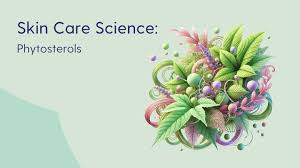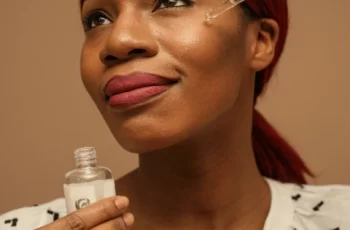
The Science of Phytosterols in Skin Care
Did you know that the same compounds that help plants stand tall and weather harsh environments can also keep your skin firm and youthful? These compounds, called phytosterols, are known not only for their ability to give plants strength and stability, but also for their ability to hydrate, repair, and rejuvenate your skin. Just as these plant-based powerhouses fortify cell walls in nature, they can strengthen your skin’s barrier, making it more resilient to aging and environmental damage.
Here, I’ll explain more about the science of phytosterols and what makes them so effective, as well as the specific benefits and side effects you should know about before introducing them into your skin care routine so you can maximize their benefits based on your unique skin type. If you don’t know your Baumann Skin Type yet, take the quiz first so you’ll know how to best incorporate these ingredients into your routine.
Phytosterols are similar to the natural cholesterol in our skin.
These plant compounds help to hydrate and protect the skin.
Some plant oils like coconut and olive oils can clog pores, so acne-prone skin types should avoid them.
What Are Phytosterols?
Phytosterols, also known as plant sterols, are a group of compounds found in plant cell membranes. Structurally similar to cholesterol in humans, phytosterols help plants maintain the integrity and functionality of their cell membranes. Due to this resemblance to cholesterol, phytosterols can impart a variety of unique benefits onto the skin.
Most notably, phytosterols are known for their ability to enhance the skin barrier, improve hydration, and improve signs of aging. In some skin care formulations, phytosterols can also help to calm inflammation and repair skin damage.
How Are Phytosterols Similar to Cholesterol in the Skin?
Phytosterols and cholesterol are both fat-soluble compounds that are structurally similar, which allows them to interact with the skin in similar ways. Both types of lipids play crucial roles in maintaining the integrity of cell membranes. In the skin, cholesterol helps to strengthen the lipid barrier, preventing water loss and protecting against environmental damage.
Plant sterols can mimic this function by reinforcing the skin’s barrier, enhancing hydration, and aiding in skin repair. Just as cholesterol supports skin health by maintaining moisture and elasticity, phytosterols provide similar benefits, making them valuable in skin care products focused on hydration and anti-aging.
Examples of Phytosterols
Plant sterols are found in oils that are derived from a variety of plant sources, each offering unique benefits for your skin. Here are a few of the most common types you’ll find in skin care products:
Beta-sitosterol is one of the most common phytosterols and is found in plant oils like avocado, coconut, castor, grapeseed, and olive oil. It is known for its soothing and moisturizing properties.
Schottenol and spinasterol are unique sterols found in argan oil, known for its anti-inflammatory and skin-soothing properties. It helps to repair the skin barrier, making it beneficial for dry and sensitive skin.
Campesterol is extracted from sunflower, corn, rapeseed, and soybean oils and is used to help improve skin elasticity and texture.
Stigmasterol comes from soybeans and certain legumes and is known for its role in repairing skin and reducing inflammation.
Brassicasterol is derived from canola oil and can help to repair the skin barrier.
Benefits of Phytosterols for the Skin
Phytosterols offer a range of benefits for your skin. Here are some of the most common skin care concerns that phytosterols can help to correct:
Dry skin. Because phytosterols are so similar to the cholesterol naturally found in our skin, these ingredients are excellent at repairing and reinforcing the skin’s lipid barrier. This helps to prevent moisture loss, keeping your skin plump and hydrated.
Signs of aging. Plant sterols can also help to stimulate collagen production, thus improving signs of skin aging like fine lines, wrinkles, and loose skin over time (3).
Dark spots. Phytosterols also have strong antioxidant qualities, allowing them to help neutralize free radicals, which cause oxidative damage and accelerate the aging process if left unchecked.
Inflammation and redness. Phytosterols have strong anti-inflammatory properties, allowing them to calm irritated skin and improve conditions like rosacea or eczema.
Damaged skin. Plant sterols support cell regeneration and repair, making them beneficial for sun-damaged skin.
Side Effects of Phytosterols in Skin Care
The most notable side effect of phytosterols to watch out for is their tendency to clog pores. Some oils are more comedogenic (pore-clogging) than others. Coconut oil and olive oil, for example, are known comedogenic ingredients , so it is best to avoid these ingredients if you have acne-prone skin.
How to Use Plant Sterols in Your Skin Care Routine
Incorporating phytosterols into your skin care routine is easy, especially since they are often included in a wide range of products. Look for moisturizers, serums, and oils that contain plant sterols as a key ingredient and are a match for your skin type.
For example, if you have dry or aging skin, you can choose a rich cream with beta-sitosterol to boost hydration and skin repair. For those with sensitive or acne-prone skin, look for lightweight serums with phytosterols to reduce inflammation without clogging pores.
If you are unsure about which products are right for you, take the Baumann Skin Type Quiz to discover your specific skin type and find the best formulations for your skin’s unique needs.
Below are some examples of high-quality skin care products that contain plant sterols.
Bottom Line
Phytosterols are powerful plant-based skin care ingredients that can be easily added to your daily skin care routine. The key is to choose the plant sterols that are best-suited for your skin type so you do not worsen clogged pores or acne. Take the quick and easy skin type quiz below to find your skin type and the best plant-based ingredients like phytosterols for your skin’s unique needs.


